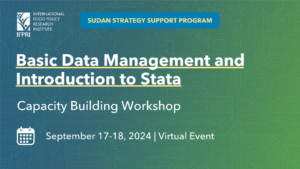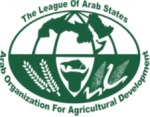Introduction
The International Food Policy Research Institute (IFPRI) is pleased to announce a 2-day online training session for Sudanese young researchers. This training is designed to equip participants with essential skills in data management and an introduction to Stata. The training will be conducted during September 17-18, 2024, and aims to build a strong foundation in handling and analyzing datasets effectively. By the end of the training, participants will have a solid foundation in using Stata for data management and basic data analysis, enabling them to handle and analyze data effectively.
This basic training is the first in a series of courses aimed at comprehensive capacity building in data analysis. Future training courses will progressively cover more advanced topics. Participants should have a basic understanding of economics, econometrics, and statistics to fully benefit from this and subsequent training.
The training will be delivered in English by Oliver Kirui, Research Fellow at IFPRI, and Alemayehu Seyoum Taffesse, Senior Research Fellow at IFPRI, Mosab Ahmed Senior Research Assistant at IFPRI, Hala Abushama, Research Assistant at IFPRI and Mariam Raouf Senior Research Associate at IFPRI. By the end of the training, participants will have a solid foundation in using Stata for data management and basic data analysis, enabling them to handle and analyze datasets effectively.
As part of IFPRI's ongoing efforts in Sudan through the Sudan Strategy Support Program (SSSP), this training aligns with our main goals of capacity building, which include offering specialized training programs to strengthen the skills of young Sudanese researchers in undertaking applied research and to equip them with needed analytical capacity to engage in policies and interventions dialogue.
SSSP’s capacity building activities focus on three key areas:
- Building technical skills for research analysis, including best practices in data collection and interpretation, economywide modeling, value chain analysis, applied microeconomic research, and experimental approaches.
- Expanding functional skills in research communication and organizational change and learning strategies.
- Establishing a knowledge sharing and analysis research network through broad-based stakeholder forums to share and discuss research, open-access data, and expansive dissemination of outputs.
The objectives of this particular training are:
- Master Stata Interface and Environment:
- Familiarize with the Stata interface and navigation.
- Efficiently use Stata for data management and analysis.
- Data Import, Export, and Management:
- Import data from various sources and export to different formats.
- Manage and clean datasets, including creating, renaming, labeling, generating, and recoding variables.
- Descriptive and Exploratory Data Analysis:
- Compute and interpret summary statistics and frequency distributions.
- Visualize data using scatter plots, histograms, and box plots for exploratory analysis.
- Basic Regression Analysis:
- Introduce participants to the fundamentals of regression analysis.
- Enable participants to run and interpret simple linear and binary (logit and probit) regression models in Stata.
- Result Interpretation, Reporting, and Practical Application:
- Interpret statistical analysis outputs and report results effectively.
- Gain hands-on experience through practical exercises, live demonstrations, and interactive Q&A sessions.
Course Outline
Day 1: Introduction to Stata and Basic Data Management
Session 1: Introduction to Sample Design (1 hour)
- Welcome and Introduction
- Overview of the course
- Overview of Sample Design
- Importance of sample design in data analysis
- Types of sampling methods
- Determining sample size
Session 2: Introduction to Stata (1 hour)
-
- Importance of data management and analysis
- Getting Started with Stata
- Introduction to Stata interface
- Navigating the Stata environment
- Understanding the different windows (Command, Results, Review, Variables)
Session 3: Data Import and Export (1 hour)
- Importing Data
- Reading data from different formats (Excel, CSV, and other formats)
- Importing data using import command
- Exporting Data
- Exporting datasets to different formats
- Saving and loading Stata datasets (.dta files)
Session 4: Basic Data Management (1 hour)
- Data Cleaning
- Handling missing values
- Basic data cleaning techniques
- Variable Management
- Creating and renaming variables
- Labeling variables and values
- Generating and recoding variables
Day 2: Basic Data Analysis and Visualization
Session 5: Descriptive Statistics (1 hour)
- Summary Statistics
- Calculating mean, median, mode, standard deviation
- Using summarize and tabulate commands
- Frequency Distributions
- Creating frequency tables
- Using tabulate and tabstat commands
Session 6: Basic Exploratory Analysis (1 hour)
- Exploratory Data Analysis
- Scatter plots, histograms, and box plots
- Using graph command for basic plots
- Correlation Analysis techniques
- Understanding correlations (using correlate command)
Session 7: Basic Regression Analysis and Reporting (1 hour)
- Simple Linear Regression
- Introduction to regression analysis
- OLS regression (using reg commands)
- Running simple linear regression using regress command
- Logit and Probit regression (using logit and probit commands)
- Interpreting Results
- Understanding output and coefficients
- Reporting and visualizing results
Course Materials
- Pre-course Reading Materials
- Introduction to Stata PDF or relevant book chapters
- Data Sets for Practice
- Sample datasets in various formats (CSV, Excel)
- Stata Command Reference Sheet
- Quick reference guide for commonly used Stata commands
- Post-course Assessment
- Optional quiz or practical assignment to reinforce learning
Teaching Methods
- Interactive Live Sessions
- Live demonstrations using Stata
- Q&A sessions after each topic
- Hands-on Exercises
- Practical exercises to be completed during and after sessions
- Discussion Forum
- Online forum for participants to ask questions and share insights
Application details
This training is open to 50 trainees, including:
- Graduate students and recent graduates with a master’s degree.
- Early career researchers.
Requirements:
- Participants should have a laptop with Stata installed.
- Interested candidates are invited to apply by submitting a CV and a one-page cover letter and the most recent university certificate.
- Please send your application materials to IFPRI-Sudan@cgiar.org by August 31, 2024. Selected participants will be notified by September 5, 2024.
- And fill this form (Link)

